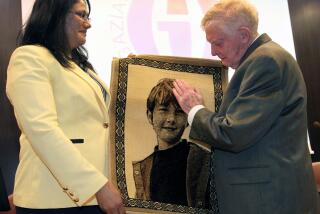Documenting one family’s painful ordeal
- Share via
In the throes of a premature infant’s medical crisis, parents often want doctors to use every technological advance possible. But little thought is given to what life after the crisis will be like.
Now a Los Angeles filmmaker is urging potential and current parents to consider that future more carefully.
In making a documentary about her 1-pound son’s birth and subsequent medical ordeal, Nicole Conn raises questions about the wisdom of the heroic efforts to save such children.
“A lot of mothers grasp on to the hope that there are these miracle babies all of the time,” Conn says. “Our film shows there is a huge ramification to having these micro-preemies and preemies.”
Conn and her partner, Gwen Baba, already had a healthy daughter when they enlisted a surrogate mother to carry their second child. But the surrogate developed preeclampsia, which is high blood pressure during pregnancy, and the family’s long crisis began.
Nicholas, born in the 25th week of pregnancy in 2002, is now 3 and the focus of “Little Man,” which has won best documentary awards at several film festivals including the 2005 Outfest in Los Angeles.
He was in the hospital for more than five months after his sudden birth, but hospitalizations, including 18 last year, were routine even after his discharge.
“He is a poster child for prematurity, in a sense, because almost anything that can happen to a preemie happened to him,” says Conn.
The filmmaker says she aimed for an honest view of the fallout from her son’s birth. Conn and Baba sometimes couldn’t agree on medical decisions, and Nicholas’ hospitalizations reduced the time each could spend with their daughter. Their lives, says Conn, “almost disintegrated.”
Today, Nicholas is what Conn calls “medically fragile.” He is legally blind, has hearing aids and is slow developing language skills. By sharing her family’s experience, Conn says, she hopes people become more realistic about the effect of high premature birth rates nationwide and the cost of keeping the most fragile babies alive.
“The message of the film is that science can save these babies, but should we be?” she says.
More to Read
Only good movies
Get the Indie Focus newsletter, Mark Olsen's weekly guide to the world of cinema.
You may occasionally receive promotional content from the Los Angeles Times.










